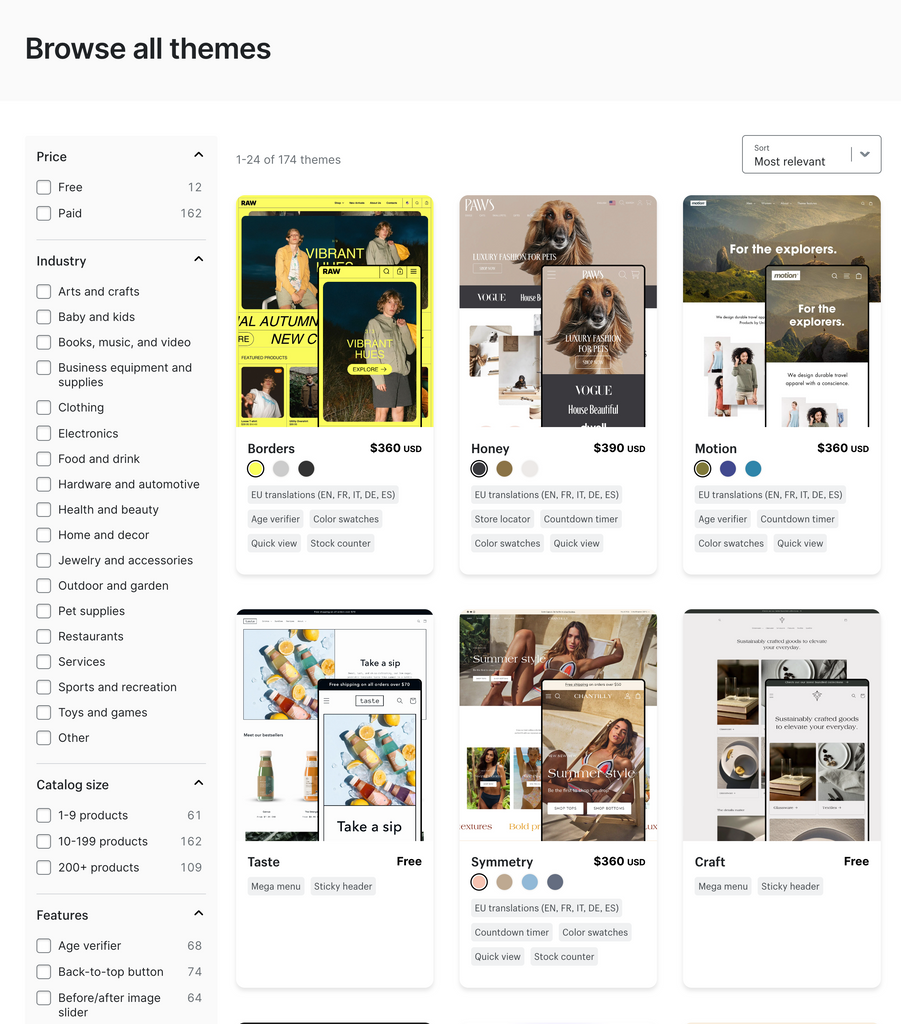When choosing the ideal e-commerce platform, Wix and Shopify often top the list. Each of these e-commerce platforms offers unique benefits and features, which can often make the decision a real challenge, especially for newcomers to online retail.
Our e-commerce specialist, Adrian, helps you answer the question: Should you choose Wix or Shopify? He explores 10 key aspects you should consider to make an informed decision for your business. Even if you've already decided on a e-commerce platform but are now considering switching providers, our comparison could provide valuable input.
Before we dive deeper into the comparison, it's important for us to be transparent: Our main goal is to help you choose a platform that will help you run your online store successfully in the long term. Therefore, we value a fair and balanced comparison. However, as a Shopify agency, we naturally have our preferences.

- What is Shopify?
- What is Wix?
-
Wix vs. Shopify: The 11 Most Important Differences
- Website builder vs. dedicated shop system
- Limited vs. unlimited product capacity
- Large design selection vs. themes with e-commerce specialization
- No code access vs. extensibility through custom coding
- Basic in-house functions vs. flexible app ecosystem
- Omnichannel only in the USA vs. worldwide
- Basic vs. advanced social media integration
- Most important vs. global payment methods
- Fixed vs. tiered transaction costs
- More diverse vs. limited product variants
- Wix and Shopify pricing
- Conclusion: The decision between the shop systems
1. What is Shopify?
Shopify is considered one of the leading cloud platforms for e-commerce, allowing sellers to easily create and manage their own online store without extensive programming knowledge. The platform handles hosting and provides a stable IT infrastructure.
In 2024, more than 4.8 million online stores in 175 countries worldwide used Shopify, including internationally renowned brands such as Pepsi, Fenty Beauty, and Gymshark. Numerous well-known companies in Germany also rely on Shopify, with over 80,000 stores from renowned companies such as SNOCKS, Sennheiser, PURELEI, Everdrop, and Hey Marly. You can find more examples in our list of the top stores on Shopify .
Get started on Shopify - with our guides & checklists 🚀
2. What is Wix?
Wix is a cloud-based website creation platform. It's an intuitive and accessible website builder that also supports e-commerce functionality.
More than 700,000 retailers worldwide use Wix as the basis for their stores. The most well-known German brands include Charles Shirts, Studio Bloom, and SHOOHS.
3. Wix vs. Shopify: E-commerce platforms compared
a. Website builder vs. dedicated shop system
We already mentioned the first important difference in the definition: Wix is primarily a website builder. The platform offers users numerous features to create any type of web presence, whether corporate websites, portfolios, or blogs. These can be expanded with e-commerce functionality.
As a result, you get a variety of tools, but many of them are irrelevant or even distracting for your pure e-commerce needs.
In contrast, Shopify is all about your online store. The platform was developed as a full-fledged e-commerce platform and offers you all the essential features you need to run online commerce not just casually, but long-term.
Therefore, in our opinion, Shopify is the perfect system for full-time merchants and individuals looking to scale their e-commerce business. If your focus is more on offering individual products on your website or blog, for example, Wix might be the right choice for you.
You can find a comparison of all important shop systems in our large provider comparison .
b. Limited vs. unlimited product capacity
Whether Shopify or Wix is the right foundation for your online store depends largely on your individual requirements. An important factor is the size of your product range.
Even with the cheapest plan, Shopify offers you complete freedom, even as your store needs grow: Unlimited product count and storage capacity ensure you can effectively display even the most extensive catalog and present it attractively. You can upload an unlimited number of videos, images, or documents for optimal product presentation.
Wix, on the other hand, has a storage limit of up to 100GB, even on its Business plan. Many merchants therefore choose Shopify to benefit from as few limitations as possible.
c. Large design selection vs. themes with e-commerce specialization
Even without extensive design experience, you can create a visually appealing online store with Shopify and Wix. The secret: design templates that define the basic layout and style of your store, but can also be customized.
Both Shopify and Wix offer professional templates that look modern and anything but outdated. Industry-specific designs are also available. However, differences can be found in quantity, quality, and customizability.
At first glance, Wix seems to have the larger selection: With 800 design templates, the platform boasts a significantly larger catalog. The catch: Not all templates are suitable for e-commerce requirements. Furthermore, not all designs are responsively optimized for smartphones and therefore don't meet the latest standards.
In the Shopify Theme Store, however, you can rest assured that each of the 140 available designs meets the highest quality standards in terms of responsiveness, performance, and appearance. All themes are created by professional designers and are regularly updated. Shopify will not even include templates that are not suitable for smartphones or have flaws.

One thing Wix and Shopify have in common is that you can customize installed themes using an intuitive drag-and-drop builder. We often see how enthusiastic Shopify merchants are about the extensive options for effectively representing their brand in their storefront. The powerful theme editor lets you add custom sections to pages, effectively highlighting product features, or provide personal insights into your business with an "About Us" page.
Conclusion: Both e-commerce platforms are generally impressive in terms of design options. However, in our opinion, Shopify has the edge in terms of quality and storytelling options.
Which Shopify themes do our experts recommend? Find all the tips in our blog.
d. No code access vs. extensibility through custom coding
Both Wix and Shopify take a no-code approach. This means you can create a powerful online store even without any programming knowledge. For example, you can add products in just a few clicks and make design adjustments effortlessly.
Nevertheless, many companies desire a customized store with specific features. Tailor-made solutions require the ability to directly intervene in the code. Many companies work with specialized agencies for this purpose.
This highlights a key difference between the platforms: With Wix, it's not as easy to customize the online store beyond the limits of the drag-and-drop editor. With Shopify, however, developers can easily access HTML, CSS, and other software code. This significantly expands the range of customization options.
e. Basic in-house features vs. flexible app ecosystem
However, you can add many shop functions in a much simpler way without any programming effort: by using apps. Many developers offer solutions for both Wix and Shopify that allow you to add additional features to your online store, such as newsletters, customer reviews, accounting, or additional sales channels.
With 300 available extensions, Wix offers a decent selection. However, it's not comparable to Shopify, which offers the most comprehensive app ecosystem in all of e-commerce with over 8,000 extensions.
In our opinion, the seamless integration and interaction of Shopify's apps is unique. They intelligently exchange data and synchronize with each other. The seamless interaction of various extensions allows you to implement exactly the functions you need for your online store.
Thanks to the large catalog, you also have the freedom to choose exactly the apps that perfectly suit your needs. Should you be dissatisfied with an extension, for example, several alternatives are usually available.

Shopify's app offerings are also constantly expanding. Since many developers now even take a Shopify-first approach, you can rely on the latest features and interfaces.
Which Shopify apps should every merchant know? Find our top recommendations in the blog.
f. Native POS functionality only in North America vs. worldwide
Many retailers today rely on an omnichannel strategy that includes not only digital commerce but also brick-and-mortar stores, pop-up stores, or trade fair appearances.
With its integrated point-of-sale system, Shopify POS, Shopify offers you an advanced solution in every plan for seamlessly connecting digital and physical sales channels. All sales are managed centrally via the Shopify backend, which, in our opinion, makes implementing omnichannel sales easier than ever before.
Although Wix also offers its own POS solution, it is currently only available in North America. While there are alternatives for the European market, these are more complicated to set up and require, for example, manual entry of sales data.
So if your goal is to have a physical presence in addition to online trading and are looking for an intuitive tool for this, we recommend Shopify as the more suitable option.
You can find out everything you need to know about Shopify POS in our guide.
h. Most important vs. global payment methods
It's one of the most crucial moments in the customer journey: Customers want to pay with their preferred payment method during your store's checkout. In fact, a lack of payment methods is one of the most common reasons for abandoned shopping carts in online retail.
With both Wix and Shopify, you're well-positioned in this regard. Whether PayPal, credit card, or Apple Pay, both platforms cover the most popular payment methods.
However, Shopify offers a wider selection: it also supports purchase on account, instant bank transfer, and a total of over 100 payment methods, some of which are regional.
If you want to ensure that international customers use their preferred payment methods and benefit from a positive shopping experience, we recommend Shopify for these reasons.
Shopify offers a powerful, native payment gateway, Shopify Payments . Learn all about the benefits and setup in our guide.
i. Fixed vs. variable transaction costs
This aspect is likely to be particularly important for merchants with high-revenue businesses: With Shopify and Wix, as with any online sale, you can expect transaction fees that you pay to the credit card and payment providers.
At Shopify, transaction fees depend on the chosen plan. Especially for large businesses, upgrading to higher pricing plans like Shopify Advanced or Shopify Plus makes financial sense, as these are associated with lower transaction costs. An overview:

In contrast, Wix does not offer tiered transaction fees. These range from 2.0% to 3.0% depending on the region.
j. Diverse vs. limited product variants
We've already discussed that, unlike Wix, Shopify never limits the number of products. Therefore, the shopping system is suitable even for huge product ranges. However, the situation is different when it comes to product variants.
Shopify allows you to create 100 variations per product with a maximum of three dimensions. For example, a T-shirt could be offered in different sizes (S, M, L, XL), fabrics (cotton, polyester), and colors (green, blue, red, yellow), utilizing all dimensions and not allowing for additional variations, such as the neckline.
Wix, on the other hand, allows six dimensions and 1,000 variations. In practice, however, this limit is only relevant for retailers with highly fragmented catalogs, such as those in the Home & Living category. In our experience, very few retailers reach these limits with their online stores.
4. Wix & Shopify pricing: Where is the price-performance ratio right?
a. Wix costs
| Wix Core | 26.18€ / month | 50 GB storage |
| Wix Business | 40.46€ / month | 100 GB storage |
| Wix Business Elite | 177.31€ / month | Unlimited storage |
b. Shopify Prices
Shopify offers three standard plans. Shopify Plus also offers an Enterprise plan that meets even the most complex e-commerce needs of large companies.
| Shopify Basic | 36€/Monthly | Entry-level plan for small businesses and individuals |
| Shopify | 105€/Month | Rapidly growing small and medium-sized enterprises |
| Shopify Advanced | 384€/Monthly | Large companies |
| Shopify Plus | From $2,000/month (custom offer) | Shopify Enterprise Edition with B2B requirements |
Included in every Shopify pricing plan:
- Unlimited payment methods (Shopify Payments)
- Integration of social media (e.g. Instagram, TikTok, Snapchat, Pinterest) & marketplaces (e.g. Amazon, eBay)
- Multilingualism
- App ecosystem (+8,000) & Theme Store (+120)
- Shopify POS for physical sales channels
All Shopify plans provide unlimited storage and are suitable for building a powerful online store. Differences tend to be found in details such as the number of accesses for employees or the level of detail of the reporting.
You can find all the information about the differences between Shopify pricing plans and help you decide in our blog.
c. Wix or Shopify: Which offers the best value for money?
In comparison, Wix initially seems like the more cost-effective shopping cart system alternative. Overall, however, Shopify offers more advantages for online retailers.
Whether it's unlimited product and storage capacity, enhanced flexibility in design and features, the Shopify POS, or extensive multichannel integration, Shopify wins us over Wix in terms of value for money. Plus, Shopify's detailed analytics reports allow you to optimize your online store with data on every plan – with Wix, you can only view customized analytics on the most expensive package.
Conclusion: Our recommendations for your choice between the shop systems
a. Who is Wix suitable for?
In our opinion, Wix is an intuitive tool for quickly and easily creating a website with online store functionality. However, a closer look reveals that the platform was originally intended as a general website builder. Many of the included features aren't relevant for e-commerce and are likely to be overwhelming for beginners.
For larger retailers, the limited product and storage capacities as well as the lack of staggered transaction costs with higher sales are annoying.
Users without programming skills can easily create a great-looking online store with Wix, but not all design templates meet modern and responsive standards. Developers and tech-savvy retailers also can't access their online store's code and make specific changes.
If you already run a Wix website that you want to add shop features to, or if you are looking for an affordable platform for a small online business, the system could still be the right choice for you.
b. Who is Shopify suitable for?
Shopify combines flexibility, scalability, and performance. This demonstrates that the platform was developed as a pure e-commerce system. Many features that Wix only offers in a basic form are integral and fully developed components of Shopify. These include the diverse range of multichannel integrations and Shopify POS for the optimal integration of offline and online business.
Shopify is also easy to use thanks to its user-friendly drag & drop editor, but offers you more comprehensive options for presenting your brand precisely in the shop and engaging in storytelling.
The design templates are high-quality and ideally suited for mobile devices. With appropriate programming skills or the support of specialists, the code can be expanded to include customized solutions. Furthermore, you can benefit from an app ecosystem with the latest extensions and interfaces, allowing you to precisely map your desired shop functionality.
What's more, Shopify is a perfect fit for your specific needs, whether you're an individual or a large company. The platform grows gradually with your brand and is easy to upgrade.
Accordingly, Shopify is our recommendation if you want to run e-commerce professionally and grow your online store in the long term.
c. Migration between the shop systems: What you need to know
Do you currently run an online store on Wix but want to switch to Shopify?
Switching from one shop system to another requires careful preparation and technical understanding. Therefore, we recommend consulting experts who specialize in such migrations.
At tante-e, we've already completed numerous migrations from various shop systems to Shopify. Learn all about our approach and the most important lessons we've learned about e-commerce platform migrations in our guide.



g. Basic vs. advanced social media integration
Successful online retailers understand exactly how to reach their target audience and know where potential customers are on the web. A crucial factor here is the use of social media. By regularly appearing in your target audience's feeds with relevant products, you can increase your brand awareness and sustainably improve your conversion rate.
Both Wix and Shopify offer a solid foundation for social media integration: Instagram, Facebook, and YouTube can be integrated natively in both ecommerce platforms. However, Shopify offers additional options: Unlike Wix, platforms like Pinterest, TikTok, Etsy, and Snapchat can also be integrated in just a few clicks.
So if you plan to integrate social media intensively into your marketing strategy and especially want to reach a younger audience through apps like TikTok or Snapchat, we recommend Shopify over Wix.